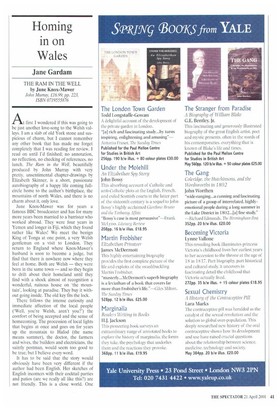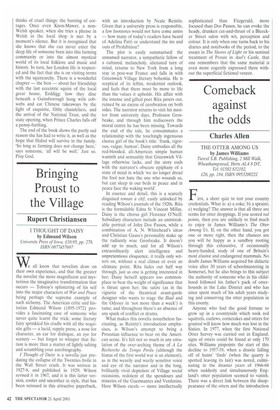Homing in on Wales
Jane Gardam
THE RAM IN THE WELL by June Knox-Mawer John Murray; £16.99, pp. 223, ISBN 0719555876 At first I wondered if this was going to be just another love-song to the Welsh valleys. I am a slab of old York stone and suspicious of charm, but I cannot remember any other book that has made me forget completely that I was reading for review. I read on until I'd finished; no annotation, no reflection, no checking of references, no lunch. The Ram in the Well, beautifully produced by John Murray with very pretty, unsentimental chapter-drawings by Elizabeth Skinner, is a ,short, passionate autobiography of a happy life coming fullcircle home to the author's birthplace, the mountains of north Wales, and there is no charm about it, only love.
June Knox-Mawer was for years a famous BBC broadcaster and has for many more years been married to a barrister who worked abroad. They were four years in Yemen and longer in Fiji, which they found rather like Wales! We meet the benign King of Tonga at one point, a very Welsh gentleman on a visit to London. They return to England where Knox-Mawer's husband is soon to become a judge, but find that there is nowhere now where they feel at home. Both are Welsh — they were born in the same town — and so they begin to drift about their homeland until they find with a shock almost of recognition a wonderful, ruinous house on 'the mountain', looking at paradise. They buy it without going inside. The old key fits the lock.
There follows the intense curiosity and immediate affection of the local people ('Well, you're Welsh, aren't you?') the comfort of being accepted and the sense of homecoming. The procession of local lights that begins at once and goes on for years up the mountain to Hafod (the name means summer), the doctor, the farmers and wives, the builders and electricians, the saintly postman, would seem too good to be true; but I believe every word.
It has to be said that the story would obviously have been very different if the author had been English. Her sketches of English incomers with their cocktail parties and patios (are we really all like this?) are not friendly. This is a close world. One thinks of cruel things: the burning of cottages. Once even Knox-Mawer, a nonWelsh speaker, when she tries a phrase in Welsh in the local shop is met by a moment's silence. But it is recognised that she knows that she can never enter the deep life of someone born into this farming community or into the almost mystical world of its local folklore and music and history. In turn, her London life is respected and the fact that she is on visiting terms with the squirearchy. There is a wonderful chapter — the best — about her friendship with the last eccentric squire of the local great house. Erddigg: how they dine beneath a Gainsborough hung with cobwebs and eat Chinese takeaways by the light of exquisite, filthy chandeliers, and the arrival of the National Trust, and the state opening, when Prince Charles falls off a penny-farthing.
The end of the book shows the partly sad reason she has had to write it, as well as the hope that Hafod will survive in the family. 'So long as farming does not change here,' says someone, 'all will be well.' Just so. Pray God.



































































 Previous page
Previous page